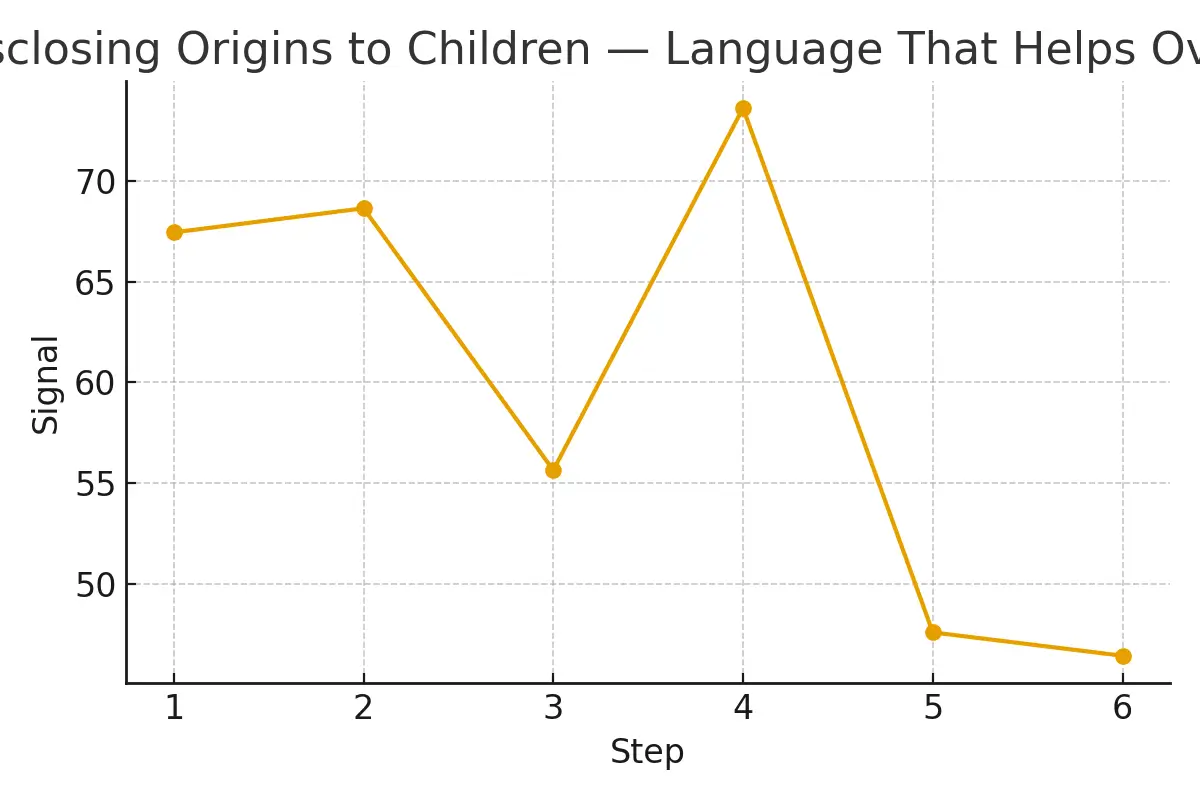
This article explains how LGBTQ+ parents can talk to children about their origins in ways that are age-appropriate, supportive, and confidence-building. It highlights the choices that truly affect outcomes, family wellbeing, and timelines, so you can move forward with clarity.
What It Is
“Disclosure” means telling children about their biological or donor origins. Research shows that early, honest, and age-appropriate communication helps children form secure identities and healthier family bonds.
Who It Helps
- Good fit: Parents using donor eggs, sperm, or embryos; surrogacy; or adoption who want to build openness and trust.
- Alternative approach: Families who choose partial disclosure or delayed disclosure due to cultural, safety, or family-specific reasons—but still want a plan in place.
Step-by-Step
- Start early — even toddlers can understand simple family language.
- Use story-based explanations — books, drawings, or simple family stories.
- Add layers with age — as children mature, add more details.
- Answer questions simply — focus on love, planning, and intentionality.
- Keep it ongoing — disclosure isn’t one talk, it’s a lifelong conversation.
Pros & Cons
Pros
- Builds long-term trust and openness
- Reduces secrecy and anxiety later in life
- Aligns with best-practice mental health guidance
Cons
- Some parents feel unprepared for questions
- Extended family reactions may add stress
- Cultural or social stigma may complicate timing
Costs & Logistics
- Minimal financial cost: mainly books, counseling, or family workshops
- Emotional investment: time, consistency, and willingness to revisit the story
- Support available: therapists, peer groups, and donor-conception networks often provide resources and scripts
What Improves Outcomes
- Practicing the story before telling your child
- Using consistent, positive language about donors or surrogates
- Getting mental health support if parents feel anxious about disclosure
- Preparing extended family to use the same supportive language
Case Study
One couple worried their child might feel “different” learning about a donor egg. They started reading age-appropriate storybooks at bedtime that framed their child’s conception as “a journey full of helpers.” By the time their child reached school age, the story felt normal, and the child proudly explained, “I had extra helpers to be born.”
Mistakes to Avoid
- Waiting until adolescence, when disclosure feels like a “secret revealed”
- Using negative or clinical language that confuses children
- Assuming children won’t ask questions later
- Leaving extended family unprepared, leading to inconsistent messaging
FAQs
Q. When is the best time to tell my child about their origins?
Ans : Start early. Even simple stories shared with toddlers build a foundation of openness. Waiting too long can create feelings of betrayal.
Q. What language should I avoid?
Ans : Avoid terms like “real parent” or “not yours.” Instead, use positive language like “donor,” “helper,” or “surrogate.”
Q. How do I explain this to very young children?
Ans : Use short, loving phrases: “We wanted you so much, and a kind helper made it possible.” Picture books can also simplify the story.
Q. What if my partner and I disagree on disclosure timing?
Ans : Consider counseling. A neutral professional can help align your values and create a joint communication plan.
Q. How do I handle extended family who say the wrong thing?
Ans : Set clear language boundaries. Provide them with the story you’re using, and correct gently but firmly if needed.
Next Steps
- Free 15-min nurse consult
- Upload your labs for personalized feedback
- Get a cost breakdown for your family-building plan
Disclosure is not a one-time task—it’s a lifelong story that grows with your child. The earlier you start with positive language, the stronger the trust and resilience you’ll build together.
Related Links

Dr. Kulsoom Baloch
Dr. Kulsoom Baloch is a dedicated donor coordinator at Egg Donors, leveraging her extensive background in medicine and public health. She holds an MBBS from Ziauddin University, Pakistan, and an MPH from Hofstra University, New York. With three years of clinical experience at prominent hospitals in Karachi, Pakistan, Dr. Baloch has honed her skills in patient care and medical research.





